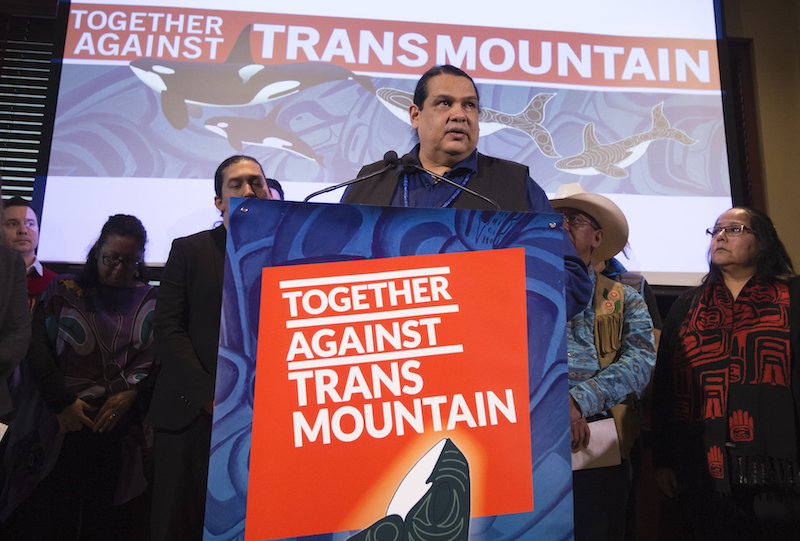
Federal Court’s Trans Mountain Ruling Betrays Principles of Reconciliation
The decision found Trudeau government met the minimum legal requirements. For Indigenous peoples, that’s not enough.

Judith Sayers Today | TheTyee.ca
Judith Sayers (Kekinusuqs) is from the Hupacasath First Nation in Port Alberni, B.C. She President of the Nuu-chah-nulth Tribal Council and is an adjunct professor at the University of Victoria in Business and Environmental Studies.
 ‘Reconciliation stopped today’ said Rueben George of the Tsleil-Waututh First Nation of the Federal Court of Appeal’s new decision. Photo by Jonathan Hayward, the Canadian Press.
‘Reconciliation stopped today’ said Rueben George of the Tsleil-Waututh First Nation of the Federal Court of Appeal’s new decision. Photo by Jonathan Hayward, the Canadian Press.The Federal Court of Appeal’s decision to uphold federal government approval for the Trans Mountain pipeline expansion project is devastating for the First Nations that launched the legal challenge.
The nine nations argued they had not been consulted properly before Prime Minister Justin Trudeau’s cabinet approved the pipeline. The second attempt at consultation was the result of an earlier court decision rejecting a first round of consultations as flawed.
Rueben George of the Tsleil-Waututh First Nation summed up the impact.
“Reconciliation stopped today,” he said.
Chief Leah George Wilson said, “This decision does not change our truth, it does not change our laws, and there was no reconciliation between Canadian law and our law.”
This decision does not in any way advance reconciliation, does not take into consideration Indigenous laws and, of course, does not talk about the United Nations Declaration on the Rights of Indigenous Peoples, which the federal government has pledged to support.
There is no mention of free, prior and informed consent, required under UNDRIP, only references to First Nations not having a veto on projects. This case is old-school empty consultation, and even though Trudeau campaigned on supporting UNDRIP, he has done little to advance the principles contained within it.
The court kept to a very narrow issue: did the cabinet reasonably conclude that the consultation flaws identified by the court in the 2018 Tsleil-Waututh decision were adequately remedied by the renewed process?
Only the cabinet could determine if the consultation process was adequate and make the decision on the project, as that is the power given to them in the National Energy Board Act.
The court said it could not look broadly at previous consultations, only at what were considered the flaws in the earlier process. The case, it said, was not about whether there should have been a different decision, or a longer or better process. The question was about whether the decision was acceptable and defensible in light of the law and evidence before the court.
The court was clear that it was ruling not on whether the legislated consultation requirements were adequate, nor on the issues raised in both consultation processes. It was simply deciding whether the cabinet decision to approve the project was “reasonable” under the current legislation.
The court did acknowledge that the constitutional duty to consult was highly significant to Indigenous peoples, and the country as a whole.
Even though the three justices said it was not up to them to decide on the adequacy of consultation, they did set out all the case law and factors that could be considered, based on the circumstances of each case.
Notably, the court states that the purpose of maintaining “the honour of the Crown” in such decisions is to facilitate the reconciliation of Indigenous interests. They further state that the duty to consult is aimed at helping to reverse historical wrongs.
Interestingly, the decision also says that the reconciliation is the first principle of Aboriginal law, a statement I have not heard before. But Aboriginal law as used by the court refers to Canadian law as it relates to Indigenous people — not Indigenous law, which is the laws of the people themselves. That’s not mentioned anywhere in this decision.
The decision also says that reconciliation is meant to create conditions going forward that will prevent recurrence of harm and dysfunction and promote a constructive relationship where people work together to advance joint welfare with mutual respect. And it notes that too often decisions affecting Indigenous peoples were made without regard for their interests, dignity, members and belonging in Canadian society, with terrible damage to their lives, communities, culture and ways of life.
I’m not sure how this decision could achieve those lofty goals. And I wonder why the justices believe proceeding with the Trans Mountain pipeline expansion won’t damage these nations and the chances for a constructive relationship.
The government did listen to them and made a few changes to the conditions for going ahead with the pipeline. But the pipeline will still run roughshod over their rights for the benefit of the public, not the nine nations.
The court concludes that reconciliation has been advanced even though the First Nations have not agreed to the project.
I am not sure what world the Federal Court of Appeal justices live in, but it’s certainly not an Indigenous one. Reconciliation is not advanced by this decision, and these nations have vowed to continue to fight this pipeline in whatever ways they can to protect what is important to them. The decision only perpetuates the historical wrongs.
The court then moves into the issue of veto. Reconciliation does not require an outcome that is satisfactory to Indigenous peoples, it says. That would give them a veto over projects like the Trans Mountain expansion.
And reconciliation does not require standards that are too strict in assessing whether the duty to consult has been adequately met, as that would also create a veto right.
“First, imposing too strict a standard of ‘perfection,’ ‘reasonableness’ or ‘meaningfulness’ in assessing whether the duty to consult has been adequately met would de facto create a veto right,” the court ruled.
The court then says that Indigenous peoples cannot use tactical behaviour such as uncompromising opposition or delays to make sure discussions fail, as this also would be a veto. Indigenous peoples also cannot “dictate” accommodations.
The court does not mention the behaviour of government officials who often use those same tactics — pushing a project, stretching out the time and not having good faith discussions on concerns. The responsibility is not just that of Indigenous peoples.
The way the court characterizes Indigenous peoples’ conduct is very condescending and not at all in the spirit of reconciliation.
The court finally concludes that Canada demonstrated it met the legal test for the duty to consult and made a meaningful, reasonable decision that will mitigate the impact and addresses the concerns of the appellants. The First Nations disagree, the court conceded, and believe their concerns were not met. But the decision says addressing their concerns would impose a standard of perfection that is not required by law, the justices decided.
The whole judgement is based on the highly subjective question of what is reasonable. From an Indigenous worldview, the federal consultation process was not reasonable.
This fight is not over. These nations are determined to stop the Trans Mountain expansion from crossing their territories.

First Nations Vow to Fight on after Trans Mountain Defeat READ MORE
It is unfortunate that First Nations have to go to a court that is based on colonial laws and practices, where the court defines what reconciliation is based on Canadian law and ignores Indigenous laws. The only real mechanisms First Nations have to fight developments are the courts, defending on the land or international forums.
The United Nations Committee on the Elimination of Racial Discrimination has told Canada to stop building the Trans Mountain pipeline expansion until it obtains the free, prior and informed consent of Indigenous peoples. This isn’t mentioned in the court case, but the committee’s rulings are politically binding, as Canada is a signatory to the convention.
In B.C., the United Nations Declaration on the Rights of Indigenous Peoples is now law. The provincial government will have to follow the declaration’s requirement of free, prior and informed consent before any developments can occur.
The fight is definitely not over, and new and innovative tools and tactics will be used as First Nations defend their lands, waters and resources.

No comments:
Post a Comment